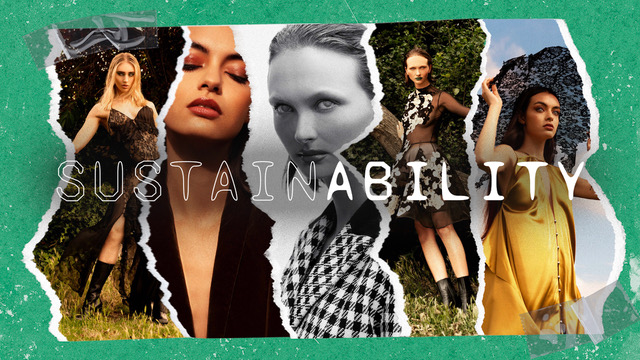
“Fashion talks to fashion, but outside that bubble people have no idea about issues we discuss, regarding responsible manufacture, social responsibility, and ethical practice.”

As a self-professed nature boy, a large majority of Joshua’s work visually references Mother Earth. Allusions to the delicacy of Michael Landy’s florals and the ethereal nature of Nick Knight’s series ‘Flora’ artfully weave throughout his debut collection. Sometimes, the references are explicit and translate quite literally — other times, they are more subverted, subtle inclusions. Small prides himself on his pieces being well cut and well made — he wants everything to sit on the body “like an Alaia; the divine fit.”
Small showcased his first collection with the support of the BFC at the Positive Fashion Exhibition at London Fashion Week this past February. He also works freelance as a writer and stylist for numerous publications. We spoke to him about his sustainability advocacy online, his brand values, and the necessary shifts in industry discourse that he envisions after COVID-19.

How does your brand ethos inform your working process?
Transparency is paramount to producing a sustainable output. For this reason, all components of each garment are listed on my website immediately upon their release. My work is created from a combination of organic fibres and ethically produced material, along with dead-stock and reclaimed fabric. I work frequently with companies, including sponsors Swarovski and Sophie Hallette. All garments are designed and made in England, and my pieces are produced on a made-to-order basis, ensuring that each garment is responsibly manufactured.

How has your process of adapting to quarantine been? Where are you working from, and what do your days currently look like?
I’m working a more broad range of projects at a more humane rate. I’m currently at my family home in Wiltshire. I’m rather lucky as I have a lot of open space nearby, so I’m able to go out for sufficient walks etc. I typically get up early and run about 5/10km each day. I’ll answer emails at either end of the day, and then use the lion’s share of my day to focus on current projects. I’m working on a new collection at the moment. It was originally scheduled for a July showcase, but this has been pushed back significantly due to COVID-19. Seeing as there is less of a need to dedicate all of my time to the new collection, I’ve been taking on more of a variety of projects. I’m now writing a lot. I appreciate that I’m able to have platforms publish my written work, as it gives me a public outlet to discuss topics that I can’t necessarily interpret and express as directly from a design perspective.

Since lockdown, you’ve been collaborating with several leaders in fashion sustainability research and advocacy to produce some fantastic digital events and live conversations. What kinds of questions have you been asking? Are you finding that your audiences are revving up about the topics and issues you’re unpacking?
I’m finding that in this new revised digital space, people are more open to consuming content they might not have otherwise. Life is slower. There seems to be a more honest and open form of engagement. Conversations that would have been less prominent and more niche, are now easily accessible through online discussion. I’m often reminded that everyone works within their own sphere. Fashion talks to fashion, but outside that bubble people have no idea about issues we discuss, regarding responsible manufacture, social responsibility, and ethical practice. For most people, these discussions aren’t even considered when purchasing a new pair of jeans from Topshop.
By shifting the conversation online on a constant basis, you widen the demographic. For instance, an additional person making more conscious choices as a result of listening to Clare Press on IG live has great potential. They probably won’t change the world, but they could. By opening up to a broader audience, the possibility of positive influence is greater. That one person might go on to influence the habits of their friend and so forth. It’s a domino effect, so the more the merrier when it comes to discussion surrounding sustainable practice.

How, in the context of COVID-19, can we continue to confront the fashion industry’s murky accountability problem? What are your hopes for our post-pandemic habits and mentality?
I think this period of flux has been highly beneficial as a catalyst for seismic change. Discussion surrounding transparency is at a high. The recent economic flux has placed a spotlight on transparency and social responsibility. You’d be hard pushed to find someone who isn’t appalled at the treatment of garment workers. The pandemic has highlighted that once again garment workers are unfortunately the weakest members of the supply chain. As we know, we are only as strong as the weakest members of society. The poor practice of high street chains in relation to cancelled garment orders is abhorrent.
Campaigns such as #PAYUP by Remake have highlighted to the consumer rather poignantly the hidden mistreatment of these workers. The more people are aware, the more likely they are to act upon this information. There have been some positive outcomes from this, as suppliers are now reporting that garment workers are now being paid. For instance BGMEA shared that of the 2,274 export producing factories 2,200 factories paid workers in March. While this is positive progress, the longer term welfare and treatment of garment workers needs to be addressed. I do believe though, that through initiatives such as #PAYUP, there is potential for positive lasting change, and I think while business as usual is paused, there is no better time to make that initial first step.

How can we support and interact with your brand during this period?
As cliché as it sounds, the best thing you can do is follow my Instagram. Any projects, talks, releases and such like, will be announced through IG. I still think it’s one of the best platforms to engage with people. Although I’m working on a new collection currently, I will be showcasing it later than planned, so subsequent releases have also been delayed. I am still open to commissions, and I work on a made-to-order basis in regards to my previous collection. For any enquiries, the best way to contact me is at studio@joshuajamessmall.com.


